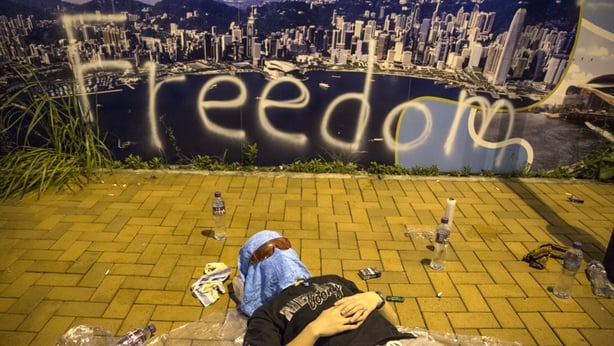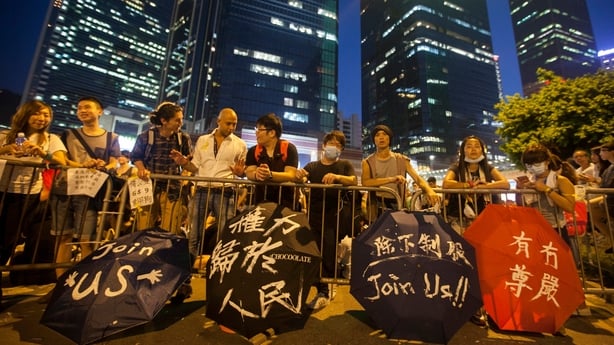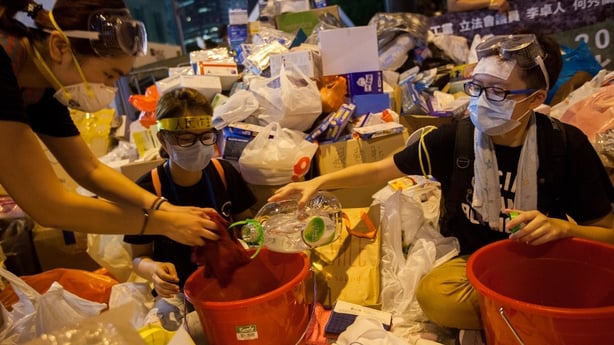Hong Kong's chief executive has called on protest leaders to "immediately" withdraw their followers from the streets in his first public comments since police used tear gas against demonstrators.
"Occupy Central founders had said repeatedly that if the movement is getting out of control, they would call for it to stop.
"I'm now asking them to fulfil the promise they made to society, and stop this campaign immediately," Leung Chun-ying said.
Occupy Central is the main grassroots group behind the past two days of street protests.
However, tens of thousands of pro-democracy protesters have extended their blockade of Hong Kong streets.
Protesters have been stockpiling supplies and erecting makeshift barricades ahead of what some fear may be a push by police to clear the roads before Chinese National Day.
Riot police shot pepper spray and tear gas at protesters at the weekend but withdrew yesterday to ease tension as the ranks of demonstrators swelled.
Protesters spent the night sleeping or holding a vigil unharassed on normally busy roads in the global financial hub.

Throughout the night, rumours spread through crowds of protesters that police were preparing to move in again.
As the sun rose many remained wary, especially on the eve of tomorrow's anniversary of the Communist Party's foundation of the People's Republic of China in 1949.
The protesters, mostly students, are demanding full democracy.
They have called on Mr Leung to step down after the Chinese government last month ruled out free elections for Hong Kong's leader, known as the Chief Executive, in 2017.
China rules Hong Kong under a "one country, two systems" formula that accords the former British colony a degree of autonomy and freedoms not enjoyed in mainland China.

Protesters massed in at least four of Hong Kong's busiest areas, including Admiralty, where Hong Kong's government is headquartered, the Central business district, the bustling shopping district of Causeway Bay, and the densely populated Mong Kok district in Kowloon.
Organisers said as many as 80,000 people gathered in the streets after the protests began on Friday night, but numbers appeared to have dwindled slightly in some areas today as some protesters went home to rest.
No independent estimate of crowd numbers was available.
Alex Chow, the leader of the Hong Kong Federation of Students, said the protests represented more than what had begun as a gathering of students and the "Occupy Central" movement.
"It has evolved into a civil movement," he said.
Protesters set up supply stations with water bottles, fruit, crackers, disposable raincoats, towels, goggles, face masks and tents, indicating they were in for the long haul.

In Mong Kok, the windows of an abandoned double-decker bus were papered with messages of support such as "Go Hong Kong People!".
A small group of protesters near the bus clapped and cheered while others played the guitar and drums.
"Even though I may get arrested, I will stay until the last minute," one 16-year-old protester said.
"We are fighting for our futures."
News of protests strictly monitored in China
Communist Party leaders worry that calls for democracy could spread to the mainland, and have been censoring news and social media comments about the Hong Kong demonstrations.
The demonstrations, labelled "illegal" by China, are the worst in Hong Kong since China resumed its rule in 1997.
They also represent one of the biggest political challenges for the government since it violently crushed pro-democracy protests in Tiananmen Square in 1989.
The movement presents the Communist Party with a difficult challenge.
Cracking down too hard could shake confidence in market-driven Hong Kong, which has a separate legal system from the rest of China. Not reacting firmly enough, however, could embolden dissidents on the mainland.
Financial fallout from the turmoil has been limited so far as investors gauge how severe the government's response might be.
Hong Kong shares were down 1.5% yesterday, its second straight fall.
Chinese shares were less troubled, perhaps because news of the protests in Hong Kong was hard to come by on the mainland.
The Hong Kong Monetary Authority, the de facto central bank, said 37 branches or offices of 21 different banks had been temporarily closed because of the protests.
The United States has urged the Hong Kong authorities "to exercise restraint and for protesters to express their views peacefully", according to a White House spokesman.
The protests have also been watched closely in Taiwan, which has full democracy but is considered by Beijing as a renegade province that must one day be reunited with the mainland.
Taiwan President Ma Ying-jeou said China needed "to listen carefully to the demands of the Hong Kong people".
Britain said it was concerned about the situation and called for the right of protest to be protected.
The United States, Australia and Singapore all issued travel alerts.

